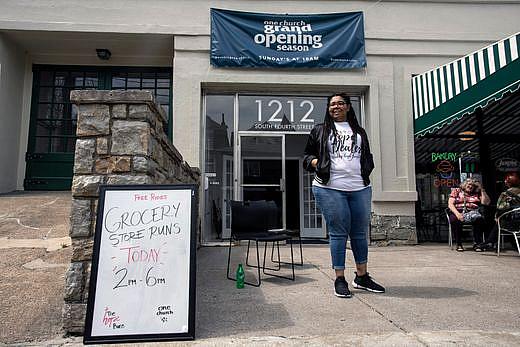People can't get to a grocery store easily. So these volunteers are driving them
The Courier Journal's continued coverage of food insecurity in Louisville is supported by the University of Southern California Center for Health Journalism's 2018 National Fellowship.
Other stories in this series include:
Tell us: How do you get food where you live in Louisville?
Dare to Care relocation may bring job training, grocery to the West End
Shelby Park's Save-A-Lot closed with little warning to neighbors
Sorry, we're closed: How everyone is hurt when grocery stores shut down
In 30 seconds: What you should know about food deserts in Louisville
Tuition or food? How college kids use food pantries to help food insecurity
Louisville has a fresh food problem. Can we fix it?
'A real crisis in Louisville': Readers respond to food desert series
How a low-income Louisville neighborhood became a fresh food oasis
How can cities end food deserts? Here are 4 solutions that worked
Louisville families shouldn't be struggling to find fresh food
No grocery store in your neighborhood? Join forces to create one
People can't get to a grocery store easily. So these volunteers are driving them
Would you shop at a mobile grocery store? Kroger is betting on it
Where You Live Determines How Much Your Eggs Cost at Kroger
How some residents get their food in Louisville's food deserts
Louisville's vacant grocery stores find new tenants. But they won't sell food
How these Louisville companies are helping employees buy affordable fresh produce
Can indoor farming fix food deserts? These Louisville students think so
Kentucky's hunger initiative earns national attention. But thousands still need food
Downtown Louisville is growing rapidly. So why doesn't it have a grocery store?
Is crime driving grocery stores out of Louisville's low-income communities?
Louisville kids are still at risk for lead poisoning. Here's how healthy eating can help
When will downtown Louisville get a grocery store? Here's what we found
Everything you need to know about Kroger's mobile grocery store in Louisville
Kroger's mobile market brings fresh food to Louisville neighborhoods without access
This nonprofit leader is giving west Louisville the black-owned grocery it 'deserves'

Hitch a ride and check out the Hope Buss, a Louisville grocery ride service
Marty Pearl/Special to Courier Journal
Linda Vidales hadn't shopped at a Walmart in years.
The closest store is more than 7 miles from her home in Old Louisville, and without a car, the 68-year-old would have to transfer buses twice to reach it.
In the past month, however, Vidales has visited the store twice thanks to a free ride service from a new nonprofit that hopes to help neighbors get food more easily.
The Hope Buss, founded in 2018, is a group of volunteers who've begun organizing free monthly grocery trips for people who don't have personal transportation.
The volunteers see the trips as a simple solution to a growing problem.
In neighborhoods across Louisville, grocery stores are closing at an increasing rate, forcing more residents to travel to markets outside their neighborhoods or to purchase food at higher-priced convenience stores.
People who do not have personal vehicles are hit especially hard by the closures. And while city leaders consider long-term solutions that can reduce the issues, volunteers with the Hope Buss have launched the ride service for residents who need help now.
"To go to the Walmart and just lollygag in a Walmart for an hour or so, it's a nice thing, it really is," Vidales said.
The ride service is based at One Church in Old Louisville, where Hope Buss founder Stachelle Bussey serves as the worship director.
Once a month, volunteers with the Hope Buss will gather at the church to give people rides to the grocery store of their choosing — be it Kroger, Aldi or another company.
The nonprofit has rented vans for the trips, and volunteers offer to drop people off at their homes once they've finished shopping.
(Also, yes, the trips are safe. On Saturday, I joined Bussey and Vidales on their ride to Walmart and had no misgivings.)
Bussey and Hope Buss member Angel Todd said the biggest issue they've experienced so far is convincing people the rides are actually free.
"For something to happen and it not cost you anything is slightly hard to believe," Bussey said. "I think in our communities, especially in some of our communities where they've kind of been damaged by some things, where people struggle for resources, I think free is a scary word. Free sometimes is going to cost you something."
Bussey was a social worker before she was ordained as a minister in 2017. She said she thinks God has called her to meet the needs of marginalized communities, and volunteering her time to give free rides is an easy way to do that.
"Everybody's not hungry. Everybody's not homeless," Bussey said. "Sometimes people have the money, they just need a chance to go."
Todd and Bussey said they hope to expand the ride service to other neighborhoods after developing partnerships with other churches and organizations.
In total, the volunteers provided transportation for more than a dozen people.
"If was even just one person, we'd still do it the next month," Todd said. "We keep running into people who it is a need for them, and they're taking us up on it."
The Hope Buss will next offer rides on May 11 at One Church, 1212 S. Fourth St.
On June 7, the group will host a health fair and grocery trips at Grace Hope Presbyterian Church in Smoketown. And on June 8 and July 13, it will return to One Church, along with the City View apartments in Russell.
[This story was originally published by Courier Journal.]

